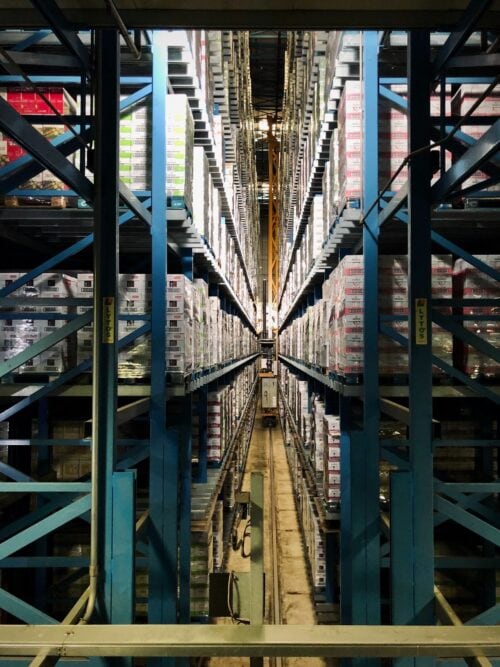Operations Management vs Supply Chain Management: Their Key Similarities and Differences

In the dynamic worlds of business and manufacturing, efficiency, effectiveness, and improvement are key. One aspect where this becomes evident is when analyzing operations management vs supply chain management.
Though distinct, these two integral components of business management are often intertwined, each playing a crucial role in ensuring that businesses operate smoothly, products meet quality standards, and customer satisfaction is achieved.
This article will explore these two management fields’ distinct roles, similarities, and intersections, illuminating their respective contributions to the modern business landscape.
What Is Operations Management?
Operations management (OM) refers to the administration of business practices to ensure maximum efficiency within an organization. It is concerned with converting labor and raw materials into goods and services as efficiently as possible to maximize profits.
An operations manager typically leads this department, overseeing the daily operations to produce goods and services. It is particularly predominant in manufacturing and service industries where managing resources, capacity, inventory, and scheduling are paramount.
OM is primarily concerned with planning, organizing, and supervising in production, manufacturing, or the provision of services. It’s about ensuring that business operations are efficient—using as few resources as needed—and effective, meeting customer demands.
Positions in Operations Management
- Operations Manager: Responsible for overseeing, designing, and controlling the process of production and redesigning business operations.
- Quality Control Manager: Ensures products meet specific quality standards.
- Inventory Manager: Oversees the management, purchase, and replenishment of goods to ensure an efficient operation.
- Project Manager: Plans, initiates, and manages projects, ensuring they’re completed on time and within budget.
- Logistics Manager: Responsible for efficient and effective coordination of everyday operations and plans to meet delivery timelines.
Each of these positions ensures that the business operations are run efficiently, resources are utilized effectively, and customer satisfaction is achieved.
What Is Supply Chain Management?

On the other side of the coin, supply chain management (SCM) encompasses the coordination and management of all businesses that fulfill customer requests. This includes planning, control, and execution of daily supply chain activities.
In SCM, companies collaborate to leverage each other’s strengths, resulting in a smoother, more efficient path from raw materials to delivery of the final product.
A supply chain manager is tasked with everything involved in the supply chain process, from planning to implementation. Their role aims to minimize shortages and reduce costs, ensuring business can meet the demand of their customers, a crucial aspect in today’s global marketplace where customer expectations are high and the market dynamics are unpredictable.
Positions in Supply Chain Management
- Supply Chain Manager: Focuses on planning, implementation, and controlling the forward and reverse flow of goods, services, and information between the point of origin and the point of consumption.
- Procurement Manager: Handles the process of finding and agreeing to terms and acquiring goods, services, or works from an external source.
- Logistics Coordinator: Responsible for organizing and moving goods from the manufacturer to consumers.
- Inventory Analyst: Manages and analyzes stock levels to ensure there are enough goods to meet customer demands without resulting in overstock or stockouts.
- Transportation Manager: Oversees the distribution and transportation of goods to customers.
These roles converge to manage and optimize the supply chain, ensuring that goods are procured, stored, and delivered efficiently and effectively, aligning with customers’ demands while balancing cost efficiency and timely delivery.
The intricate dance between operations management and supply chain management is essential for businesses seeking a niche in highly competitive markets.
The balance and collaboration between these two enables companies to meet customer demands effectively, optimize costs, and ensure timely delivery, fostering customer loyalty and business growth.
By understanding their distinct roles and collaborative potential, businesses can harness their synergies, enhancing efficiency, and driving innovation in an ever-evolving business landscape.
Operations Management vs. Supply Chain Management
Navigating through the intricate processes of operations management and supply chain management, dissecting their characteristics and impacts on organizational efficiency and productivity is essential.
While both are integral to a company’s success, they have distinct roles, functions, and benefits that contribute to various business operations and growth aspects.
Similarities
Here are some of the similarities.
Focus on Efficiency
Both management styles prioritize enhancing efficiency in business processes. They aim to reduce costs, optimize resources, and maximize output.
Customer Satisfaction
Ensuring customers’ needs are met in a timely and effective way is central to operations and supply chain management. They strive to enhance the quality of products/services and ensure timely deliveries.
Quality Assurance
Both involve rigorous quality control processes to ensure products or services meet set standards and expectations, thus enhancing customer satisfaction and loyalty.
Risk Management
Identifying, assessing, and mitigating risks in production and supply processes is a common concern, aiming to ensure business continuity and reliability.
Inventory Management
Both styles manage inventory levels to align with customer demands and business goals, balancing the needs to reduce costs and ensure product availability.
Differences
However, there are also differences.
Scope of Operations
Operations management is focused on optimizing internal processes and functions, while supply chain management involves coordinating processes across various companies to deliver final products to customers.
Focus Areas
Operations management is centered on the organization’s process efficiency, productivity, and quality. In contrast, supply chain management concerns the efficient movement and transformation of goods from raw materials to the final product delivered to customers.
Technology Utilization
Supply chain managers often rely on advanced technological platforms for global sourcing, tracking, and coordination. Operations managers focus on improving efficiency and quality within the organization, sometimes with less emphasis on extensive technology.
Strategic Orientation
Supply chain management is more strategically oriented, focusing on the entire supply chain’s competitive advantage and value creation. In contrast, operations management often focuses on tactical and operational improvements within the organization.
The Future of Operations Management and Supply Chain Management
In the evolving business landscape, both operations management and supply chain management are undergoing significant transformations, shaped by technological advancements and changing market dynamics.
Integrating technologies like artificial intelligence, machine learning, and IoT revolutionizes process efficiency, real-time decision-making, and customer experience.
For supply chain management, the advent of technologies like blockchain is enhancing transparency, traceability, and security in global supply chains. Automated logistics, AI-powered demand forecasting, and advanced analytics enable supply chain managers to make informed decisions, optimize processes, and enhance customer satisfaction in real-time.
On the other hand, operations management is benefiting from automation, data analytics, and AI to optimize production schedules, enhance quality control, and reduce operational costs. Technologies like robotics and automation are streamlining the manufacturing process, reducing resource waste, and improving efficiency.
Neither is outshining the other; instead, they are evolving concurrently. Operations management is witnessing the integration of smart technologies for efficient processes, while supply chain management is broadening its horizons with enhanced connectivity, data-driven decision-making, and global outreach.
- AI and Machine Learning: Enhancing predictive analytics, demand forecasting, and decision-making.
- Blockchain: Increasing transparency and traceability in supply chains.
- Robotics and Automation: Streamlining operations and enhancing production and material handling efficiency.
- IoT: Providing real-time data and connectivity for enhanced decision-making and process optimization.
As the business ecosystem becomes increasingly interconnected and competitive, the collaboration and integration between operations management and supply chain management will be pivotal.
Harnessing the potentials of emerging technologies and innovation will drive efficiency and foster resilience, adaptability, and sustainable growth in the face of evolving market dynamics and uncertainties.
Conclusion
In wrapping up the dialogue on operations management vs supply chain management, it’s pivotal to underline their distinct yet interlinked roles in optimizing business processes and enhancing customer satisfaction.
Both are evolving, integrating cutting-edge technologies to meet the dynamic demands of today’s global marketplace. While they have unique focuses, their synergistic functioning is integral for organizational agility, efficiency, and competitive edge.
As businesses navigate future challenges, a balanced approach that leverages the strengths of both management styles will be instrumental in fostering sustainable growth and innovation.
